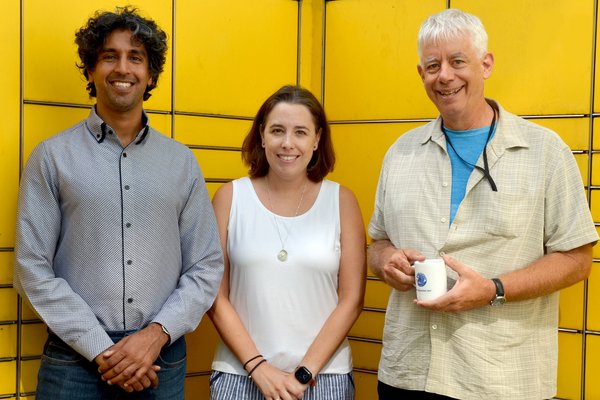Summer research and discoveries: International Visiting Scientists at the Max Planck Institute for Meteorology in Hamburg
Brian Mapes specialises in the study of atmospheric cloud convection and its role in large-scale weather patterns. His work focuses on the complex interactions between convective weather events and their impact on our climate. His fascination with atmospheric phenomena began during his first flight in 1978, when his heart soared at the fantasy of running around on those temporary landscapes, the valleys and alps, of the rising cumulus clouds the airplane was dodging between.
Allison Wing is dedicated to researching the structure and dynamics of tropical convection and investigates, for example, how clouds and thunderstorms cluster in the tropics. Using a combination of theoretical models, observational data and simulations, she analyses how these patterns contribute to the formation of tropical cyclones and how they interact with the larger-scale climate system.
At the age of 5, Allison Wing witnessed a hurricane — an experience that sparked a long-standing interest in weather. This early experience, combined with her fascination with physics and her desire to better understand phenomena that have a direct impact on people and society, eventually led her to atmospheric research.
Martin Singh works intensively on predicting changes in tropical atmospheric circulation in response to global warming. His research includes cloud dynamics and large-scale circulation systems such as the Hadley cell. As he explains: “My fascination with my field was sparked because I find how the atmosphere organizes clouds to be very beautiful”.

Research objectives at MPI-M and participation in ORCESTRA
As guests of the Climate Physics Department, all 3 scientists are actively involved in research projects aimed at improving our understanding of atmospheric processes. Two of our visitors are also involved in the ORCESTRA measurement campaign, which is just starting.
At the Institute, Brian Mapes is rethinking convective cloud patterns from the perspective of evolutionary game theory. By treating convection as the simplest form of life, or as a form of social science, rather than as a hopelessly complicated form of statistical physics, new insights into the behaviour of the atmosphere will be gained. Understanding the interconnections is important — sometimes for better predictions, sometimes simply to better assess the limits of predictability.
In collaboration with colleagues at MPI-M, Allison Wing is investigating how convection, clouds and precipitation are organised in the tropical Atlantic. These cloud systems influence both local and global climate. The team aims to understand the role of cloud-radiation interactions in these systems. This summer, Allison Wing is preparing for the ORCESTRA field campaign, where she will join the research vessel Meteor as part of the BOW-TIE sub-campaign. She will then return to MPI-M to analyse data from various instruments and to continue working on her questions.
Allison Wing explains: “As Principal Investigator for PICCOLO, the US part of ORCESTRA funded by the US National Science Foundation, I am responsible for using the SEA-POL radar to measure precipitation and its patterns during the cruise. I’m looking forward to spending six weeks on Meteor with the BOW-TIE team".
At the same time, Martin Singh is studying the structure of the Intertropical Convergence Zone (ITCZ). He is particularly interested in why cloud formations within the ITCZ sometimes split into two separate regions with weak winds in between, and sometimes merge into a single band. As part of ORCESTRA, he will participate in the HALO flight campaign PERCUSION around Cape Verde, contributing to both flight planning and data analysis.
First impressions of Hamburg
All three researchers are fascinated by Hamburg’s vibrant and accessible urban environment.
Brian Mapes fondly remembers a previous visit to Hamburg in late 2016 and is looking forward to revisiting his favourite places in midsummer. He enjoys being able to eat outdoors and ride his bike without having to wear gloves and a coat as he did in winter.
Allison Wing finds Hamburg a vibrant and liveable city and appreciates how much of the city is within walking distance. She is particularly impressed by the excellent public transport system. Her hometown of Tallahassee, Florida, is picturesque but sprawling and not very centralised, and you have to drive everywhere. So, she’s looking forward to living a more urban lifestyle for a while! She’s also enjoying the Hamburg summer from another perspective: “I’m also looking forward to escaping the hot and humid Florida summer for a bit".
Martin Singh is impressed by how easy it is to get around Hamburg, especially by bike. He is impressed by the large number of parks and green spaces in Hamburg and how actively people make use of them. At least in the summer!
Special discoveries
Brian Mapes likes to explore cultural sites such as the Ethnology Museum and enjoy Nordic cuisine in a Swedish restaurant. He also enjoys watching English-language films at the Abaton cinema, although he prefers to spend his summer evenings outdoors.
Allison Wing is looking forward to experiencing Hamburg in the different seasons of the year, as she has already been here in the winter.
Martin Singh is drawn to the vibrant Schanzenviertel and enjoys the lively restaurant scene and evening walks in the Schanzenpark.
We would like to thank Dr. Martin Singh, Prof. Dr. Allison Wing and Prof. Dr. Brian Mapes for their time and the brief insights into their work and experiences. We look forward to an inspiring collaboration and the further results of their research and wish them a rich experience and enriching time in the summer city.
More information
Prof. Dr. Brian Mapes at the University of Miami
Prof. Dr. Allison Wing at the Florida State University
Dr. Martin Singh at the Monash University
Department Climate Physics, MPI-M
Project ORCESTRA
Contact
Communications Department
Max Planck Institute for Meteorology
communication@mpimet.mpg.de
